The Monster 1100 is the latest bike in Ducati's lineup to receive the EVO (Evoluzione Desmodue) up-spec treatment. With 246,483 Monsters sold since the model line’s 1993 debut, creating a model like the 1100 EVO seems a good way to kick off the 18th year of Monster production.
The big-bore naked Italian roadster has been a favorite of the staff here since it first appeared in 2009 as a replacement for the Monster S2R. The strong pulling power of the comparatively simple air-cooled two-valve engine and the overall excellent handling performance from the chassis are key qualities we’re particularly fond of in the biggest of the Monsters.
Now with a revised engine, new exhaust, tweaks to ergos, reduced weight and the addition DTC (Ducati Traction Control) and ABS as standard, there's even more to like about the biggest of the Monsters.
Monster EVOlution
Where do you start to improve a motorcycle without re-engineering it to the point of losing the original bike in the process? In Ducati's estimation, a useful enhancement to the engine is step one.
Changes to the air-cooled L-Twin include revised cylinder heads with reworked intake ports, inlet valves gaining 5% more lift, and exhaust valve lift increased by 4%. Top-end oiling is improved for better cylinder head cooling, and revised piston shape bumps compression to 11.3:1 from 10.7:1 on the previous Monster. Keeping the pistons spinning is a new, lighter-weight flywheel designed similarly to the flywheel in Ducati’s supersport 848.
An all-new 2-1-2 exhaust migrated from under the Monster’s saddle to the right side of the bike. Although the new exhaust bears more than a passing resemblance to the Diavel’s exhaust, according to Monster 1100 EVO Project Engineer Giuseppe Caprara, the systems are not the same.
What the Monster EVO does share with the Diavel is its “race-like” slipper clutch, which incidentally is not the same as the APTC slipper clutch in the Monster 696, 796 and Hypermotard 796.
Caprara also confirmed to me that it’s chiefly the reworked cylinder head that gives the Monster 1100 EVO a 5-hp gain over the previous model’s 95 hp at 7500 rpm (76 ft-lbs at 6000 rpm remains unchanged from the 2010 Monster 1100).
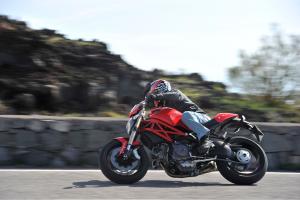 Considering we live in a world where literbikes make 200 hp at the crank, speed junkies may not get excited by a modest gain of 5 ponies. But what is noteworthy is that this new 100-hp figure allows the Monster 1100 EVO to lay claim to possessing the strongest Desmodue engine Ducati has ever created.
Considering we live in a world where literbikes make 200 hp at the crank, speed junkies may not get excited by a modest gain of 5 ponies. But what is noteworthy is that this new 100-hp figure allows the Monster 1100 EVO to lay claim to possessing the strongest Desmodue engine Ducati has ever created.Not bad for applying a few strokes of the computer mouse to an oldie-but-a-goodie air-cooled Twin.
An inverted, fully adjustable 43mm Marzocchi fork replaces the Showa sticks on the ’10 Monster 1100, and a Sachs shock with spring preload and rebound damping adjustments keeps the back-end in check. New, lighter-weight 10-spoke wheels wear updated Diablo Rosso II tires. Pirelli Testing Manager Salvo Pennisi explained the Rosso front tire has improved grip for wet weather riding, while the redesigned dual-compound rear tire has improved braking performance, better grip at maximum lean and is longer wearing.
Without the previous model’s undertail exhaust system to contend with, Ducati gave the new 1100’s tailsection a cleaner appearance, and also gave passenger and rider footpegs separate mounts where the previous 1100 employed a single, large cast piece to which both peg sets were connected. And in the interest of improved rider comfort the 2011 model’s handlebar risers are 20mm higher than last year. A 31.9-inch seat height is the same as last year.
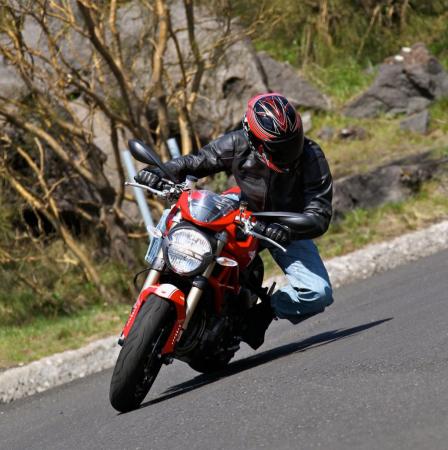 The Monster 1100 EVO has a rock-solid chassis that enables a rider to take full advantage of the bike’s 48-degree lean angle. The Monster 1100 EVO has a rock-solid chassis that enables a rider to take full advantage of the bike’s 48-degree lean angle. |
Lastly, the Monster 1100 EVO gets what Ducati calls the Safety Pack.
Standard issue for this Monster is ABS and Ducati Traction Control (DTC). This is the first Monster model to receive DTC. The DTC is somewhat tailored for this bike since there are four rider-selectable traction control levels rather than eight levels on other Ducati models equipped with TC. The fewer levels were simply a matter of tuning the TC to suit the Monster’s 100 hp engine, whereas the extra TC levels make more sense on the 150-ish horsepower 1198. The Ducati Data Analyzer (DDA) – you might utilize this feature to analyze lap times at the racetrack – is also available.
The Monster 1100 EVO has a claimed weight of 373 pounds, compared to the 377 pounds on the ABS-equipped 2010 Monster 1100 and 374 pounds on the Monster 1100S.
Monster impressions
Surface streets in the municipality of San Giovanni la Punta, Sicily (an enclave of sorts of the larger city of Catania of the province of the same name on Sicily’s eastern coast) are in about as good a shape as you should expect of such an ancient part of the world. Pavement on the narrow, winding streets is in decent condition, but there are nevertheless lots of chunked, cracked and patched sections of the streets.
It was while darting through these tiny corridors, like a rat avoiding the local Don, that I first started to appreciate how well the Monster’s stout new Marzocchi fork and Sachs shock gobbled up the broken and battered concrete. Both front and rear suspension were suitably damped for this type of urban assault, keeping the bike tracking true and me in comfort.
Our ultimate route was to climb a curvaceous road snaking its way out of the area of Zafferana Etnea and up the south side of the ever-smoldering Mt. Etna. At approximately 10,900 feet Etna is the largest active volcano in Europe and dominates the skyline over Catania. Ascending the serpentine, contorted ribbon of concrete presented a good opportunity to reacquaint myself with the Monster’s grunty engine.
Powerful torque, particularly noticeable starting around 4000 rpm and building all the way to the 8500-ish rev limit, develops in a deliberate but linear manner. This steady delivery of power proved useful for digging out of the numerous hairpin switchbacks that at times made the road seem as though it was layering over itself. It was also during the climb that I found myself cursing ever-stricter emissions regulations that have caused Ducati to burden the 1100 with gearing taller than I would like in cogs 2 and 3.
While torque is plentiful, run a gear too high while attempting to exit a slow speed corner and you’ll likely find the engine lugging and chugging. These less-than-ideal gear ratios aren’t limited to the 1100, as we’ve bemoaned tall gearing on the Monster 796 and Hypermotard 796, too.
After reaching the road’s highpoint we stopped for a cappuccino, café Americano, espresso or whatever injection of Italian water you like, at a café located in the alpine-like village of Rifugio Sapienza. Here, small roadside stands and average-looking shops sell the usual array of tourist-y trinkets, most of which are made from or have something to do with lava rock. The stuff’s plentiful, after all, since it covers much of the mountainside, creating a lunar landscape for mile after mile up and down the mountain.
If you’re really feelin’ your alpine oats, there’s downhill skiing action in Rifugio. Just don’t get disappointed by the single chairlift if you’re used to Summit County, Colorado.
After inhaling a couple of the best cannolis I’ve ever had, it was time to go down the mountain toward Nicolosi where the road straightens and re-enters city life. This portion of the ride, like the climb up, gave me new opportunities to assess different aspects of the new Monster’s performance.
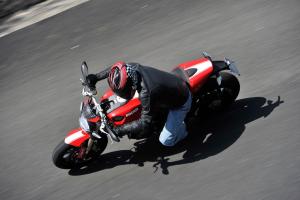 Steering ease, mid-corner stability, front-end feedback and overall chassis performance is excellent. The unflappable chassis inspires a rider’s confidence in the front-end, with the whole bike tracing an effortless arc ‘round each bend. The Monster 1100 EVO’s nimble but planted chassis (as well as the 696 and 796’s for that matter) is a genuine and defining strength of this Duc.
Steering ease, mid-corner stability, front-end feedback and overall chassis performance is excellent. The unflappable chassis inspires a rider’s confidence in the front-end, with the whole bike tracing an effortless arc ‘round each bend. The Monster 1100 EVO’s nimble but planted chassis (as well as the 696 and 796’s for that matter) is a genuine and defining strength of this Duc.Since there’s so much loose, sand-like lava rock dust in certain spots, both going up and down the mountain, there were lots of chances for DTC to put itself in action. Level 2 seemed ideal for my riding, as it prevented spin up in low traction sitches (gravel, sand) but never struck me as overly intrusive. However, at low speeds, like when getting on the gas while pulling away from a stop in low traction conditions like gravel patches, even DTC Level 1 can intervene rather abruptly, to the point that the bike feels as though it's going to stall.
DTC access via a single Mode switch on the left-side switch pod – the same switch that also accesses all other settings in the LCD instrument panel – isn't intuitive enough.
It took several attempts to discern that holding the switch one way accesses a DTC submenu, and that changing DTC levels requires the switch move in the opposite direction. It takes some time to get the routine down, but once figured out the process is less complex. You can disable DTC altogether, and the system will retain its setting when the bike is switched off. The ABS system is also defeat-able but defaults to ON each time the ignition is turned on.
ABS, like DTC, is a good and practical feature, but the anti-lock system struck me as “first generation,” and not as refined as ABS on some current model sportbikes.
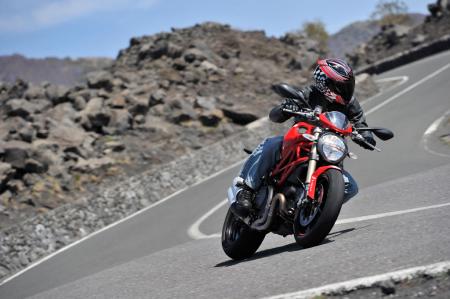 A machine perfect for carving arcs in the mountains, the Monster 1100 EVO is equally at home pulling commuter duty. It’s both a great weekend play toy and urban-assault weapon. A machine perfect for carving arcs in the mountains, the Monster 1100 EVO is equally at home pulling commuter duty. It’s both a great weekend play toy and urban-assault weapon. |
At times the system produces some serious backpressure or “pump-up” when ABS activates. The sensation is that the Brembo radial master cylinder’s lever has stopped moving. This intermittent but funky feel is more profound at the rear brake pedal; it’s as if the pedal or lever has reached the end of its travel despite not actually doing so. Hard to say exactly what the ABS is or isn’t doing, but its as though the system isn’t opening and closing the control valve quickly enough to allow the brakes to apply and release as often they should.
To clarify, it took routinely aggressive application of the radial-mount Brembo calipers to get the ABS to act up; under normal use the system was trouble-free. And, in fairness, this delayed pulsing at the lever isn’t exclusive to the Monster 1100. I’ve had similar experiences on other ABS sets from different manufacturers.
The new back-torque-limiting clutch works well. Despite my best efforts to induce rear-wheel hop after rapid-fire, high-rpm downshifts, the clutch kept the gearbox from binding under engine braking. The slipper-style clutch and smooth-shifting 6-speed transmission performed on par with some of the best clutch/transmissions around – Japanese-bike-like, if you will.
Summary
The Monster 1100 EVO replaces the standard, as well as the Ohlins-equipped S model 1100, in the 2011 Monster lineup. While it usually isn’t good to eliminate choices for the consumer, all the updates on the EVO only serve to make a bike we liked before even better. Sweetening the deal is an MSRP of $11,995, the same price as last year’s base model.
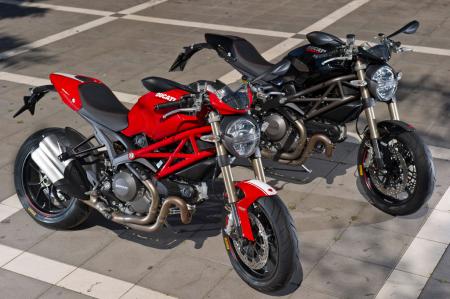 Ducati retained all that we liked about the previous model Monster 1100 in the new EVO 1100, and adds to it worthwhile updates and enhancements, while at the same time keeping consumers’ tightly held pocket books in mind. Grazie, Ducati! Ducati retained all that we liked about the previous model Monster 1100 in the new EVO 1100, and adds to it worthwhile updates and enhancements, while at the same time keeping consumers’ tightly held pocket books in mind. Grazie, Ducati! |



 4:14 AM
4:14 AM
 Unknown
Unknown


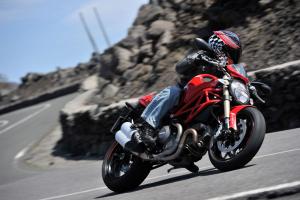
 Posted in:
Posted in: 




0 comments:
Post a Comment